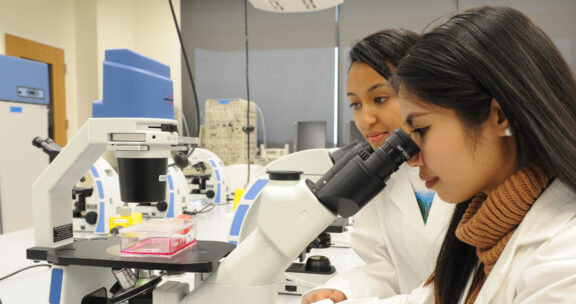
TLST Scholarship for Admits through Fall ’26
Not sure where to start? Request your viewbook!
Browse Events or Watch a Virtual Info Session
Ready to take the next step? Sign up for pre-transfer advising.
Translational Life Science Technology
Apply For ProgramFast Facts
- One-of-a-kind program
- Offered exclusively at UMBC-Shady Grove
- Located in the lucrative Biohealth Capital Region
Introduction
Earn your bachelor’s degree in translational life science technology, an applied biotechnology program, to learn how to turn scientific discoveries into life-saving solutions. Our unique model helps you save on tuition while earning the same UMBC degree as four-year students. You will graduate with skills in cell biology, lab instrumentation, bioinformatics, biostatistics, epidemiology, and biochemical engineering.
This innovative program is only offered at UMBC-Shady Grove, so all interested students will take upper-level courses at the modern facilities in Rockville, MD. We also offer an optional track in bioinformatics if you are interested in this growing field within biotechnology.
Steps to Your Degree
Before Transfer
Prerequisites
Required Prerequisites
- Principles of Biology I
- Principles of Biology II
- Principles of Chemistry I & Introductory Chemistry Lab
- Principles of Chemistry II
- Principles of Genetics
- Elementary Applied Calculus I or Calculus for Life Science I or Calculus I
- English Composition
It is also recommended that you complete as many of the following courses as possible before transfer. These courses are required for graduation from UMBC and most cannot be taken at UMBC-Shady Grove:
- Organic Chemistry I and Lab*
- Introductory Physics*
- Microbiology
- 3 Arts and Humanities courses (from at least two different disciplines)
- 3 Social Science courses (from at least two different disciplines)
- 1 Culture course
- World Language Intermediate-Level (consult advisor about exceptions)
Note: Courses marked with * are strongly recommended prior to transfer.
Community College Agreements
UMBC’s TLST program has articulation agreements with the following schools. If you are planning to earn your associate degree, these agreements outline the courses you should take to prepare for transfer:
- Montgomery College
- Frederick Community College
STEM Ready
Students currently enrolled in Montgomery County Public Schools or at Montgomery College can join our STEM Ready pathway to explore opportunities in science, technology, engineering, and math before transfer to UMBC-Shady Grove.
For UMBC Home Campus Students
UMBC-Shady Grove only offers upper-level (300- and 400-level) courses for its programs. However, because TLST is exclusive to UMBC-Shady Grove, students may choose to begin the program by taking their lower-level (100- and 200-level) courses at UMBC in Catonsville. Students will then complete the program at UMBC-Shady Grove in Rockville, Maryland. Upper-level courses for TLST can only be completed at UMBC-Shady Grove.
Advising & Next Steps
All students are strongly encouraged to complete pre-transfer advising before joining us at UMBC-Shady Grove. Explore pre-transfer advising options.
Admitted and current students should visit our advising FAQs.
Degree Requirements
Major Requirements
UMBC Graduation Requirements
- Minimum of 120 academic credits
- Minimum of 2.0 GPA
- 45 upper-level (300 & 400-level) credits
Bioinformatics Track
TLST students have the option of declaring a bioinformatics track as part of their program. The courses included in this track offer extensive, hands-on training in computer systems, bioinformatics, machine learning, Python programming, and AI, as well as bioinformatics applications for genomics.
Bioinformatics and AI are advanced computing technologies that are utilized to bridge the gap between research and clinical outcomes. There is a growing need for individuals with experience in these areas in the biotechnology and healthcare industries.
Course Descriptions
Please view the Undergraduate Catalog for full course descriptions.
Visit USG’s website to learn which classes will be available during the upcoming semester.
BTEC 300: Biotechnology Survey: Legal, Ethical, Regulatory & Biosafety Issues
Fall only
This course will raise awareness on a range of non-technical topics that frame the field of translational medicine and the biotechnology industry. Weekly meetings will cover topics ranging from legal decisions that affect what products can be patented by the biotechnology industry, to regulatory trends in the US and abroad, to the ethics of genomic mining and manipulation, and synthetic life.
BTEC 303: Applied Cell Biology
Fall and Spring
This course will provide an overview of modern cell biology with emphasis on applications in cell-based therapeutics and commercial processes. The course will include a foundation in molecular aspects of cell biology including cell structure, organelle structure and function, protein trafficking, membrane dynamics, cell adhesion, signal transduction, cell cycle control, and cell death. These concepts will be presented in the context of current applications of cell biological approaches in clinical medicine and commercial production of biologicals. The course comprises a 1 CR laboratory component where students will learn hands-on techniques for cell culturing and imaging.
BTEC 310: Instrumentation & Methods for the Biotechnology Laboratory
Fall only
Presented from the perspective of the biotechnology industry, this course will give a systematic, understandable, and practical introduction to basic biotechnology laboratory methods and the principles underlying the operation of common and sophisticated instrumentation. The course is intended for students who are interested in learning how to work in a biotechnology research & development laboratory.
BTEC 330: Software Applications in the Life Sciences
Spring only
This course will provide an overview and basic practical skills in software tools that are used widely in biological research and development in the areas of general productivity, basic data analysis and databasing, statistical analysis and programming, analysis and comprehension of high-throughput genomic data, biological sequence analysis and bioinformatics, image analysis and morphometry.
BTEC 344: Epidemiology
Spring only
This course will provide an intensive introduction to epidemiologic concepts and methods for students majoring in Translational Life Science Technology and for others intending to engage in, collaborate in, or interpret the results of epidemiologic research as a substantial component of their career.
BTEC 350: Statistics for Translational Life Science
Fall and Spring
This course will provide an effective introduction to statistical methods used commonly by researchers who engage in, collaborate in, or interpret results of Translational Life Science Technology.
BTEC 395: Translational Bioinformatics
Fall only
This course introduces the emerging field of translational bioinformatics, which encompasses the development of algorithms for biological data analysis and their clinical and research applications. It covers four main topics: biological sequence analysis, biological databases and ontologies, whole- and meta-genome analysis and network biology. It includes a primer on evolutionary theory, high-throughput techniques, sequence statistics and other central concepts in bioinformatics, followed by an overview of the history, translational component and scientific impact of bioinformatics.
BTEC 430: Translational Biochemistry and Molecular Biology
Fall and Spring
This is an introductory level course focusing on essential concepts of biochemistry and molecular biology. Topics include the purification and analysis of macromolecules, the transmission of genetic information, and high throughput sequencing. This course also includes a six-week laboratory practicum on extraction, purification and analysis of DNA, RNA and proteins from cultured mammalian cells and E.coli.
BTEC 444: Translational Cancer Biotechnology
Fall only
This course is designed to provide an in-depth overview of biotechnological aspects of the diagnosis, clinical management, and study of malignant disease. It is designed to provide Translational Biotechnology majors and others whose career path intersects with the course of neoplasia.
BTEC 453: Biochemical Engineering
Fall only
An overview of biochemical and microbiological applications, commercial and engineering processes including: industrial fermentation, enzymology, ultrafiltration, chromatography, and food and pharmaceutical processing. Important principles include: enzyme kinetics, cell growth, energetics and mass transfer. Processes of interest include those that are involved in the formation of desirable compounds and products or in the transformation, or destruction of unwanted or toxic substances.
BTEC 462: Bioprocess Design and Control
Spring only
This is a course in bioprocess control theory and applications. The first half of the course focuses on developing mathematical models for basic bioprocesses such as continuous reactor systems and heat transfer equipment. Students learn analytical techniques (MATLAB and Simulink) to find the time domain response of these systems to common types of forcing functions (step, pulse, and impulse functions). The second half of the course focuses on applying classical control theory to bioprocesses. Students construct block flow diagrams for the components of the control loop, and how to calculate the time domain closed loop response. Students also learn how to design feed-back control systems and various controller tuning techniques. The use of MATLAB, SIMULink, and instructor-written software allows students to observe process control behavior for a wide range of systems.
BTEC 470: Advanced Biomanufacturing
Spring only
The course builds upon the foundation of bioprocess design principles and focuses on actual design projects, and includes components associated with financial analysis. Students taking this course are expected to demonstrate working knowledge of these principles in their design choices, reports and presentations.
BTEC 495: Professional Internship and Project-based Research Experience
Fall, Spring, or Summer
This course will be offered in a two semester sequence, giving students an opportunity to acquire hands-on training in academic or industrial research labs that will be analogous to the undergraduate research experiences available on the UMBC campus.
More About the Program
Career Opportunities
Maryland is home to over 33 labs and agencies and 300+ biotech companies, nearly 75% of those are in the Montgomery County region. The TLST program is designed to open many doors in the world of applied biotechnology, including the areas of:
- drug discovery
- food and agriculture
- environmental protection
- forensics and security
- manufacturing
Students graduating with this degree will have opportunities in research and development, manufacturing and services, quality and regulatory affairs, and management.
Learn more about biotechnology career paths (PDF).
Accelerated Bachelor's/Master's Program
If you’re interested in graduate school, UMBC’s Accelerated Bachelor’s/Master’s program can help you save time and money by allowing you to enroll in graduate-level courses in biotechnology as an undergraduate. These courses can be applied to your bachelor’s and master’s degree or graduate certificate at UMBC-Shady Grove.
Faculty
Full-Time Faculty
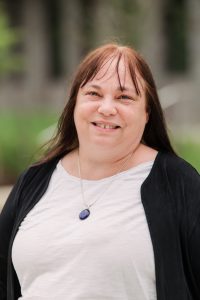 Elizabeth Friar, Ph.D.
Elizabeth Friar, Ph.D.
Translational Life Science Technology Program Director
Phone: TBD
Email: efriar1@umbc.edu
Office: BSE, Room 3104
Dr. Friar received a B.A. in Biology from Oberlin College and then a Ph.D. in Botany from the University of Georgia, focused on the molecular systematics of the woody bamboos. She then completed a postdoc at the University of Arizona with Dr. David Mount and Dr. Robert Robichaux, where she started her work on the molecular systematics and evolution of the Hawaiian silversword alliance, which continues to the present day. She then joined Rancho Santa Ana Botanic Garden (RSABG) as a faculty member in the Botany Program in the Claremont Graduate University, part of the Claremont Colleges, in Claremont California. There, she received several research grants from the National Science Foundation and approximately $1M from W.M. Keck Foundation on data integration in molecular evolution. From there, she joined the National Science Foundation as a Program Officer in the Evolutionary Processes Cluster within the Division of Environmental Biology. Before joining UMBC, she spent one year at Oklahoma State University and then four years at the University of Central Oklahoma, where she has focused on undergraduate teaching.

Manik Ghosh, Ph.D.
Assistant Director of TLST Laboratories
Phone: 240-665-6462
Email: mghosh09@umbc.edu
Office: BSE, Office 3108
Dr. Ghosh earned his Ph.D. in Biology from Sir J. C. Bose Institute, Calcutta, India. Following his PhD, he worked in many international institutes as a research scholar. He worked at the University of Toronto, Canada; National Institutes of Health (NIH); and University of Tennessee Health Science Center. His field of study is cell biology, in particular, the genetic regulation of how immune cells and stem cells migrate to the site of inflammation. His studies aimed to decipher the molecular targets that could be implicated in the therapeutics of human diseases. Dr. Ghosh identified that Wnt5a was a regulator of CXCR4, a pleiotropic chemokine receptor capable of regulating many human diseases, including cancer cell metastasis, HIV, and autoimmunity. On 2014, Dr. Ghosh launched a startup named Annagen Biotech located in Baltimore, MD. The mission of the startup is to develop a non-PCR based personalized disease detection kit.
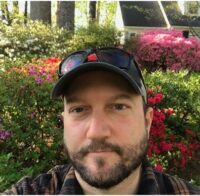 Jeffrey Robinson, Ph.D.
Jeffrey Robinson, Ph.D.
Full-time Bioinformatics Instructor
Phone: TBD
Email: jrobin2@umbc.edu
Office: BSE, Office 3110
Dr. Robinson is an alum of UMBC, with a BS in Biological Sciences, Master’s in Biotechnology from John’s Hopkins, and a PhD in Biological Sciences from Dartmouth College’s Molecular and Cellular Biology graduate program.
During his career he has worked extensively in both bench science and bioinformatics in a range of research areas. These include 7 years on microbial genome sequencing and proteomics projects, as a research associate with TIGR/J. Craig Venter Institute. His PhD research investigated molecular evolution and phylogenetic applications of miRNA complements and their expression in marine invertebrates.
Robinson’s postdoctoral research at NIH included laboratory studies of molecular network dynamics of epithelial barrier function. His bioinformatics research included biomarker discovery in clinical cohorts for digestive disorders and obesity investigations, and NCI clinical trials for tumor immunotherapy drugs. During his postdoctoral research, Robinson gained significant experience in data science practice and methodologies, and is currently working on computational modeling and integration of clinical, omics, and image datasets.
As bioinformatics course developer and lecturer with UMBC’s Translational Life Science Technology Program, he brings this experience in bioinformatics and biotechnology research to course development and education to the next generation of biomedical workers under the translational science paradigm.
Adjunct Faculty
 Abhay Andar, Ph.D.
Abhay Andar, Ph.D.
Instructor
Dr. Abhay Andar received his Bachelors in Life Science from the University of Mumbai, and his Masters and Ph.D. in Biomedical Science and Engineering from the University of Glasgow, Scotland, UK. Much of his research career has been engaged in microfluidic device design for biological processes-on-a-chip. Dr. Andar is currently a Senior Scientist at Potomac Photonics focusing on early device development and strategies towards commercializing medical devices. Dr. Andar has been involved with biopharmaceutical-based projects throughout his career. More recently he was involved with a DARPA project that focused on Point-of-care systems for biopharmaceuticals manufacturing. Dr. Andar completed his postdoctoral training at the University of Maryland School of Pharmacy focusing on transdermal microneedle technology and dermal formulations for enhanced delivery of nanoparticles and macro-molecules. As a faculty member at UMBC, Dr. Andar believes that one must create an environment that is interactive and collaborative, where problem-solving and critical thinking skills form the core of the class sessions. Dr. Andar is keen on promoting independent thinking, which can be essential for research-based thinking and may be applied to real-life situations.
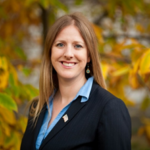
Ashley Grant, Ph.D.
Instructor
Email: amgrant@umbc.edu
Dr. Ashley Grant is a Lead Biotechnologist at the MITRE Corporation and an Adjunct Professor at George Mason University’s Biodefense Program. As a Lead Biotechnologist, she evaluates Department of Defense activities, serves as a subject matter expert on chemical and biological issues across multiple government agencies, and is the Principal Corporate Bio-Nano Laboratory Biosafety Officer. Prior to her role at MITRE, Dr. Grant worked as Senior Biological Scientist at the Government Accountability Office, as an American Association for the Advancement of Science (AAAS) Science and Technology Fellow in the Chemical and Biological Defense Program Office in the Department of Defense and at the National Academies of Science on the Committee on International Security and Arms Control. Dr. Grant received her PhD in experimental pathology and a MPH in epidemiology from the University of Texas Medical Branch at Galveston, a MA in Defense and Strategic Studies from the United States Naval War College, and a BS in Chemistry and a BS in Business Economics and Management from the California Institute of Technology. She is a National Registry of Certified Microbiologists in Biological Safety Microbiology and a certified Project Management Professional. Ashley is the current Caltech women’s water polo single-season goal record holder.
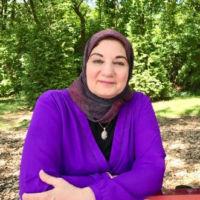
Mina Izadjoo, Ph.D.
Instructor
Email: mizadjoo@umbc.edu
Dr. Mina Izadjoo is the President and Chief Science Officer of Integrated Pharma Services (IPS). Her current research interest in the private sector focuses on developing novel diagnostic, therapeutic and regenerative technologies for hard-to-treat human diseases. Prior to her current position she was the Vice President and Chief Science Officer of Trideum Biosciences. Formerly, she was “Senior Distinguished Scientist” and Director of the Diagnostics and Translational Research Center (DTRC) of the Henry M. Jackson Foundation (HJF) for Advancement of Military Medicine. She served as the Chief of the Microbiology and Wound Biology and Translational Research (WBTR) Division at the Armed Forces Institute of Pathology (AFIP) in Washington DC prior to her position at HJF. Dr. Izadjoo holds an Associate Professorship at Uniformed Services University for Health Sciences (USUHS) and is President Elect of the Washington Academy of Sciences. Dr. Izadjoo is the recipient of numerous awards including the 2017 JWC Best Innovation in North American Award, the FCC Leader of the Year Award in recognition of her internship and training program for college students, and the Innovator of the Year Award from MWBC. Dr. Izadjoo received her Ph.D. in Microbiology and Immunology from Louisiana State University in 1992, followed by six years of post-doctoral fellowships at Texas A&M University and NIH in molecular biology and immunogenomics.
 Andrew Kurtz, Ph.D.
Andrew Kurtz, Ph.D.
Instructor
Dr. Andrew Kurtz is a Program Director in the Center for Strategic Scientific Initiatives at the National Cancer Institute (NCI), where he develops and leads programs in emerging scientific areas. Recently, he helped to launch Cancer Grand Challenges, a new partnership established between the NCI and Cancer Research UK, which supports large, international cancer research teams. Dr. Kurtz previously worked in NCI’s Small Business Innovation Research (SBIR) Development Center, where he managed projects focused on the preclinical development of novel cancer therapeutics. In this role, he also led initiatives to assist NCI-funded small businesses in commercializing their innovations, such as the ‘Innovation Corps at NIH’ program. Dr. Kurtz first joined the NCI in 2005 as a AAAS Science and Technology Policy Fellow to provide scientific and communications support to The Cancer Genome Atlas management team. Prior to joining the NCI, he worked in industry developing high-throughput bioanalytical assays to support pharmacokinetic studies for the pharmaceutical sector. Dr. Kurtz received a BS in chemistry from the University of Texas at Austin and a PhD in biochemistry and molecular biology from The University of Texas Medical Branch at Galveston, where his dissertation focused on the cellular pathways that repair DNA-protein crosslinks. Dr. Kurtz also holds an Executive Certificate in Strategy and Innovation from the MIT Sloan School of Management.
 Mark Talbott, Ph.D.
Mark Talbott, Ph.D.
Instructor
Email: ctalbott@umbc.edu
Dr. Talbott currently serves as General Manager of Training and Development, Safety, and Regulatory for Shimadzu Scientific Instruments, Inc. Prior to the current position, he served the Company as Molecular Spectroscopy Product Manager and is currently recognized as a Certified Senior Spectroscopist by the Society of Applied Spectroscopy. He received his B.S. in Chemistry from Indiana University and Ph.D. in Chemistry from the University of Louisville. His research involved the conformational characterization of sphingomyelin and its interactions with water and cholesterol in mammalian lipid lens membranes. Mark has devoted his career to the application of molecular spectroscopy to a range of scientific and industrial applications and interests. Experienced with a wide variety of matrices, he has successfully applied spectroscopy and innovative spectroscopic techniques to the characterization of many chemical systems, including nanoparticles, biological membranes, API’s and drug products, chemical terrorism compounds, thin film coatings, ophthalmic polymers, organic polymers, and inorganic cements. He is the author of peer-reviewed publications, Application Notes, Teaching Notes, and Presentations detailing the use of spectroscopic techniques. Mark has twenty years of experience as adjunct faculty for various Institutions and is currently focused on creating short training segments that emphasize the subtle keys to successful spectroscopy.
Alumni Spotlight

Jackelyn Flores '22
TLST
“When I decided to pursue a TLST major, it was really nice to know that the jobs were local. Montgomery County is one of the few hubs in the United States for biotechnology.”
B.S. in TLST Information Request

